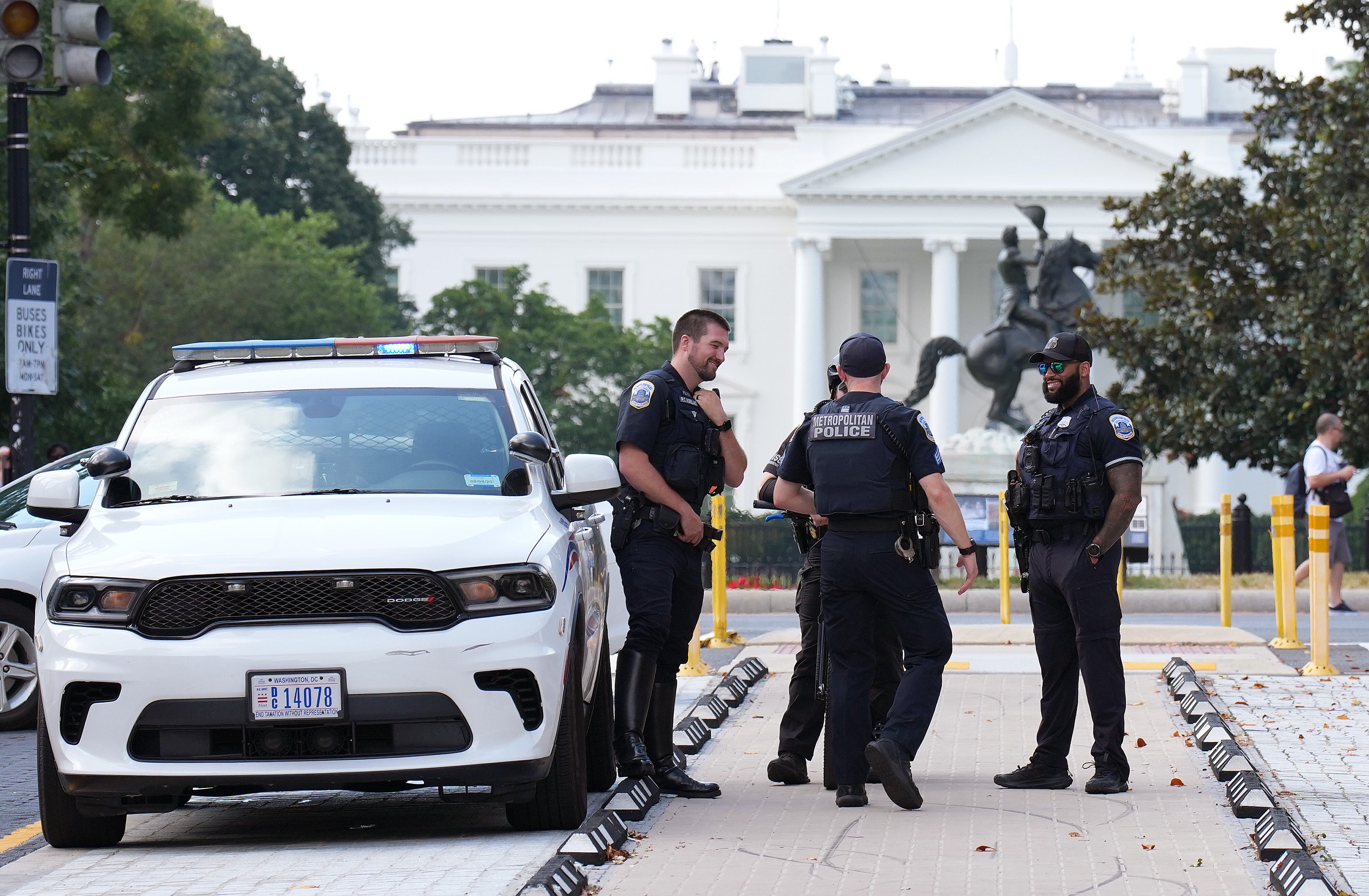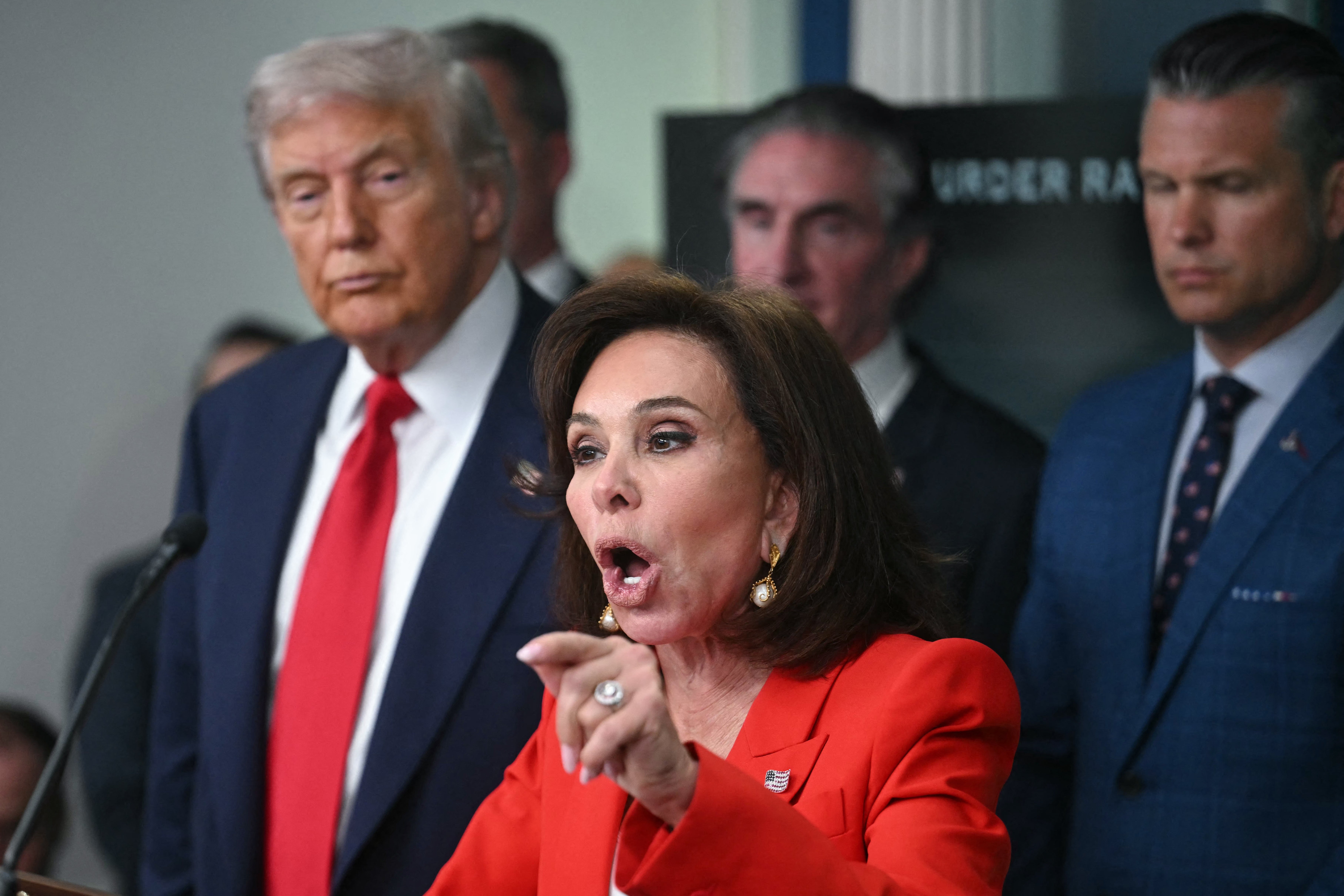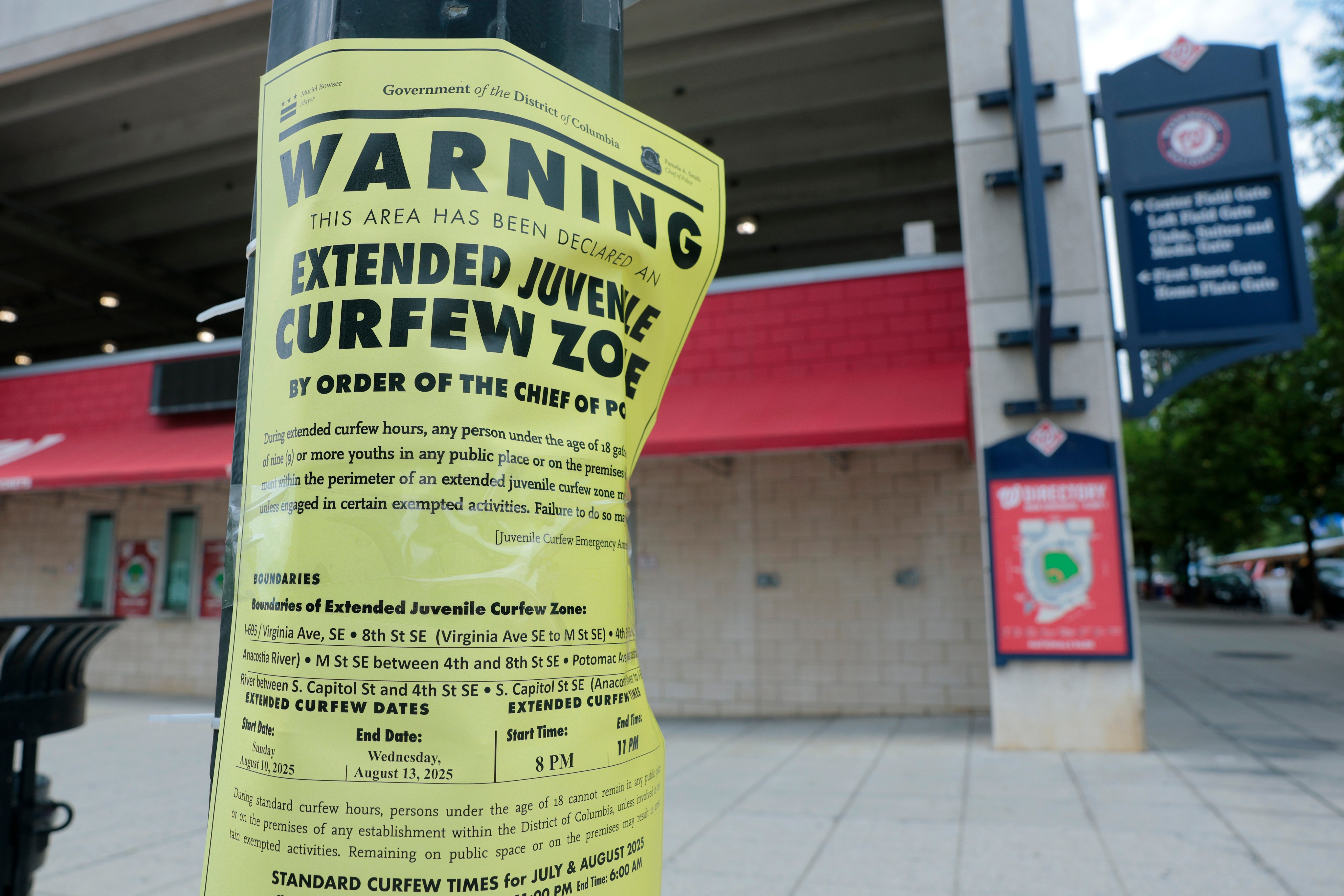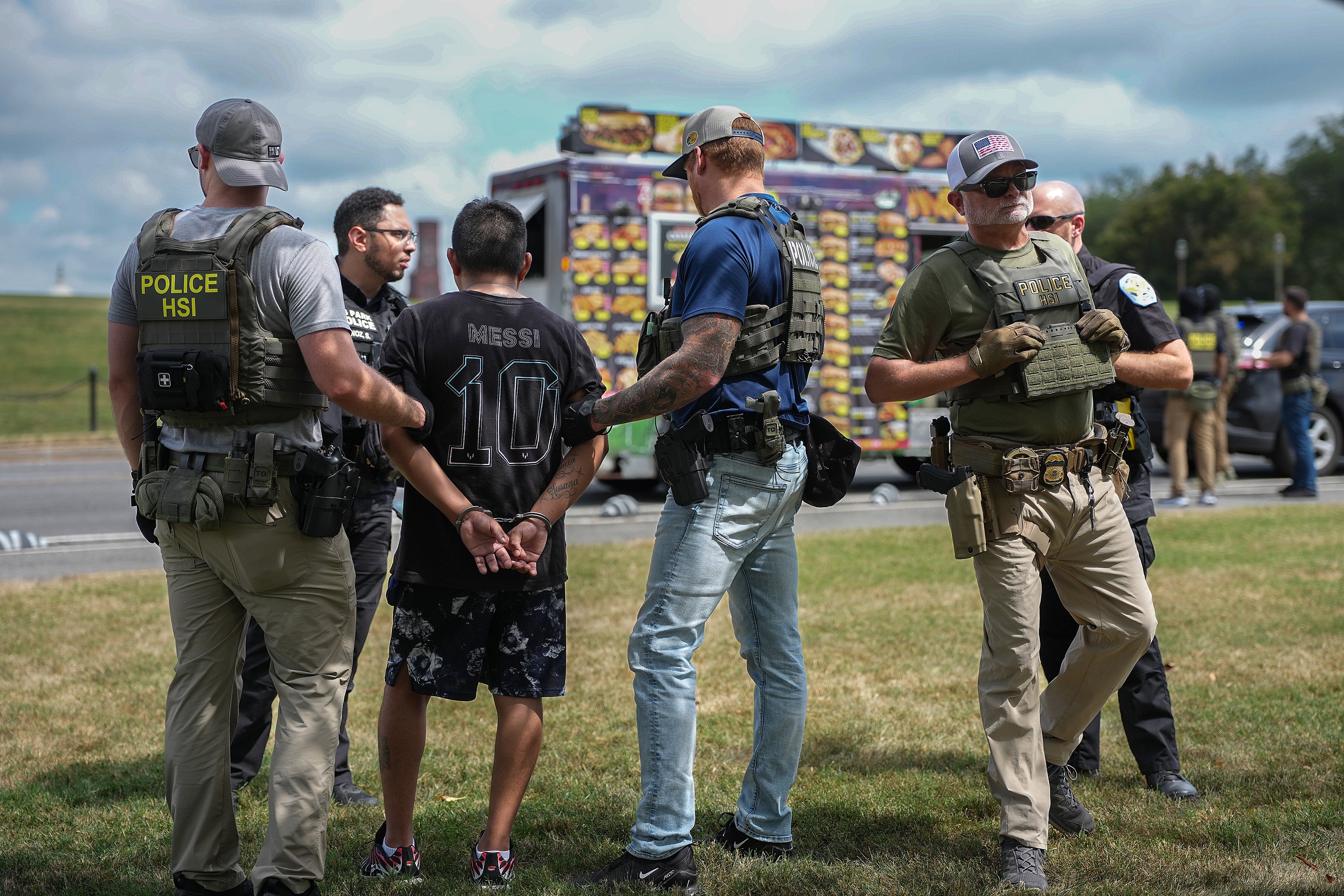As he deployed the National Guard and surged federal law enforcement agencies into the nation’s capital, President Donald Trump gave local police in Washington, D.C. permission to retaliate against a population under federal occupation.
Trump, seizing on images of a beaten former Department of Government Efficiency staffer to justify his takeover, announced a “crime emergency” to put the Metropolitan Police Department under the administration’s control.
“See, they fight back until you knock the hell out of them, because it’s the only language they understand,” Trump said from the White House on August 11.
“You spit and we hit,” the president said. “And they’re standing there and people are spitting in their face and they’re not allowed to do anything. But now they are allowed to do whatever the hell they want.”
Civil rights groups and legal experts fear the president’s remarks will embolden police officers to abandon constitutional guardrails — and signal to Americans that those protections are meaningless.

“It’s very scary that the president felt the license to say this,” said Insha Rahman, vice president of advocacy and partnerships at the Vera Institute of Justice and the director of Vera Action.
His remarks appear to endorse police “running roughshod over constitutional rights and due process protections,” she told The Independent.
That language is “extremely dangerous” and shows a “blatant disregard to the constitutional mandates that the president and every government entity is bound to,” according to Kristin Henning, Georgetown Law professor and director of the Juvenile Justice Clinic and Initiative.
No, police cannot do “whatever the hell they want,” Rahman added. But officers “will feel emboldened to do things that we know are not only legally unsound and questionable but also unpopular — like sweep away people and forcibly move people who are homeless, or tell people that they can’t be in certain public places.”
Civil rights groups fear the administration is using the city’s police force for a political power grab, while putting American troops on the ground as an occupying force that’s not trained to perform basic law enforcement tasks like responding to 911 calls.
Instead, D.C. has become “political theater” using “blatantly phony justification for abuse of emergency powers,” according to Monica Hopkins, executive director of the ACLU of the District of Columbia.
Trump is “using the word ‘emergency’ as a blank check for asserting federal control whenever it suits his agenda – abusing emergency powers while militarizing our communities and endangering the very people he is sworn to protect,” according to Mike Zamore, national director of policy and government affairs at the ACLU.
The Independent has requested comment from the Metropolitan Police Department.

Trump has a vivid history of dogwhistle calls to action. Proud Boys were inspired by Trump’s call to “stand back and stand by.” His call for a “big protest” that “will be wild” fueled a mob of his own supporters on January 6, 2021, when he encouraged a crowd to “fight like hell” before they stormed the Capitol.
He also routinely threatens heavy-handed tactics in other Democratic-majority cities. At his White House press conference this week, he singled out Baltimore, Chicago, Los Angeles, New York and Oakland — all of which have Black mayors and large minority populations that have overwhelmingly voted against him.
In his remarks, Trump suggested teenagers were “randomly attacking” citizens and called for trying children as young as 14 as adults to “lock them up for a long time.” Jeanine Pirro — the former Fox News personality recently confirmed as U.S. Attorney for Washington, D.C. — raged against “young punks” and demanded laws be changed to send teenagers to adult prisons.
Those threats are “counterproductive and ineffective,” according to Henning, author of The Rage of Innocence: How America Criminalizes Black Youth, which draws on her experience representing young Black people in Washington’s juvenile courts.
“They don’t use these words, but they are definitely blaming all Black kids in the city for these problems,” Henning said. “[Residents] are living with a state of fear that has been concocted, and that’s all a part of a larger strategy. … It’s not even that deeply veiled, because it’s been done over and over again.”
The Independent has requested comment from the White House.
Black and Latino youth are facing “extraordinary psychological trauma in contact with police,” with reported high rates of fear, anxiety, depression and hopelessness, according to Henning.
“When they go out on the streets and they encounter police, they see these federal agents, the anxiety is real, and the reaction is an adolescent response,” she said. “They might assert their First Amendment right to say, ‘I don’t want your presence.’ All of the things that teenagers do … They can go from zero to 100 in an instant.”

Thousands of people flooded streets across the country throughout the summer of 2020 for daily demonstrations against police brutality and racism, including in the streets of Washington, D.C.
“Can’t you just shoot them?” Trump said at the time, according to his former Defense Secretary Mark Esper. “Just shoot them in the legs or something?”
Trump also demanded law enforcement officers “crack skulls” and “beat the f*** out” of protesters, according to the book Frankly, We Did Win This Election: The Inside Story of How Trump Lost by The Wall Street Journal’s Michael Bender.
In his second administration, Trump is no longer moored by a handful of advisers who could curb his impulses. He was surrounded by the nation’s top law enforcement officials as he announced “liberation day” for D.C. this week.
Trump invoked Section 740 of the District of Columbia Home Rule Act, which grants the federal government authority to run the locally controlled police department. He needs congressional authority to extend that control beyond 30 days.
On August 13, Trump said he wants “long-term extensions” of his federal occupation.
“I don’t want to call a national emergency. If I have to, I will,” he said.
Trump also called for Congress to pass a “crime bill” that’s “going to initially pertain to D.C.” but serve as a “very positive example” for other cities.

Despite the administration’s claims that crime is “out of control” in D.C., the data shows the opposite: 2024 saw the lowest violent crime rates in the capital in more than 30 years, while reports of violent crime within the first seven months of 2025 have plunged 26 percent from last year.
Those rates mirror national downward trends, according to FBI crime data released during Trump’s administration.
“Trump has a long history of weaponizing fear about crime,” according to Rahman, highlighting the president’s campaign rhetoric of American cities under siege and an “invasion” at the U.S.-Mexico border.
“People are supportive of police, but they want police to focus on responding to the most serious cases, being responsive, and investigating and solving serious crime,” she said. “What they do not want — that we have had a long history of seeing in this country — is police overreach.”
Henning fears that the city’s Metropolitan Police Department is under “undue pressure” to boost arrests and “put numbers on the board,” she told The Independent.
“That pressure is going to be there, whether they admit it or not,” she said.




